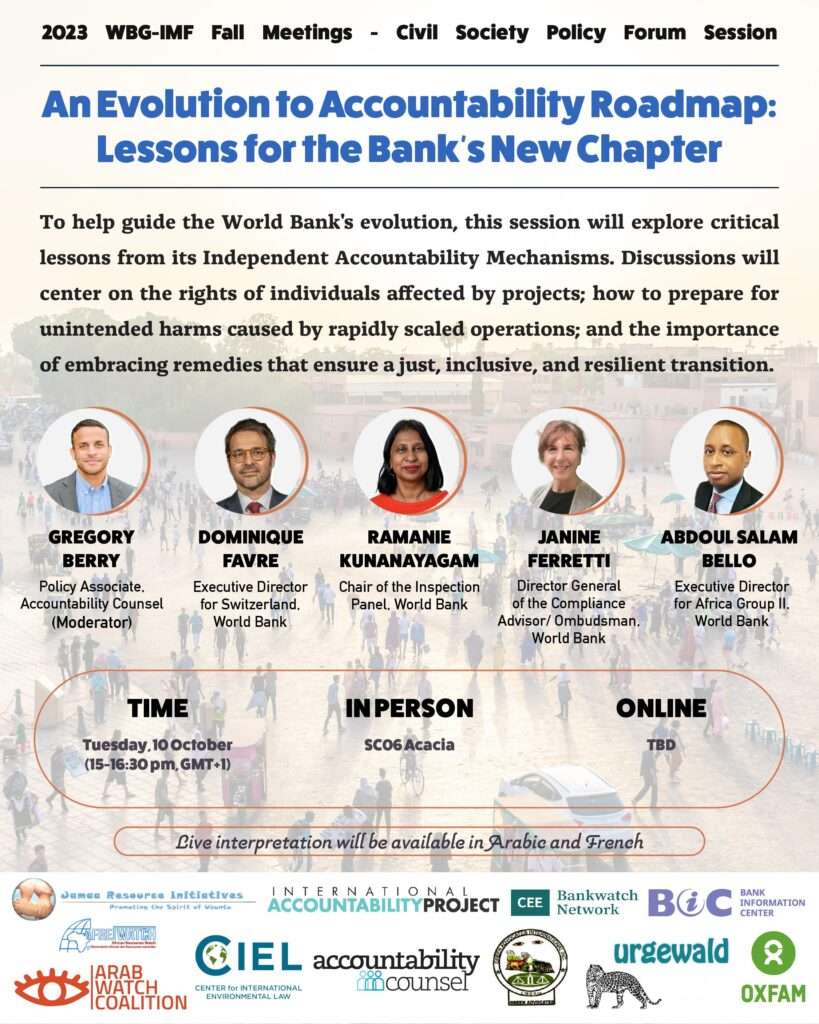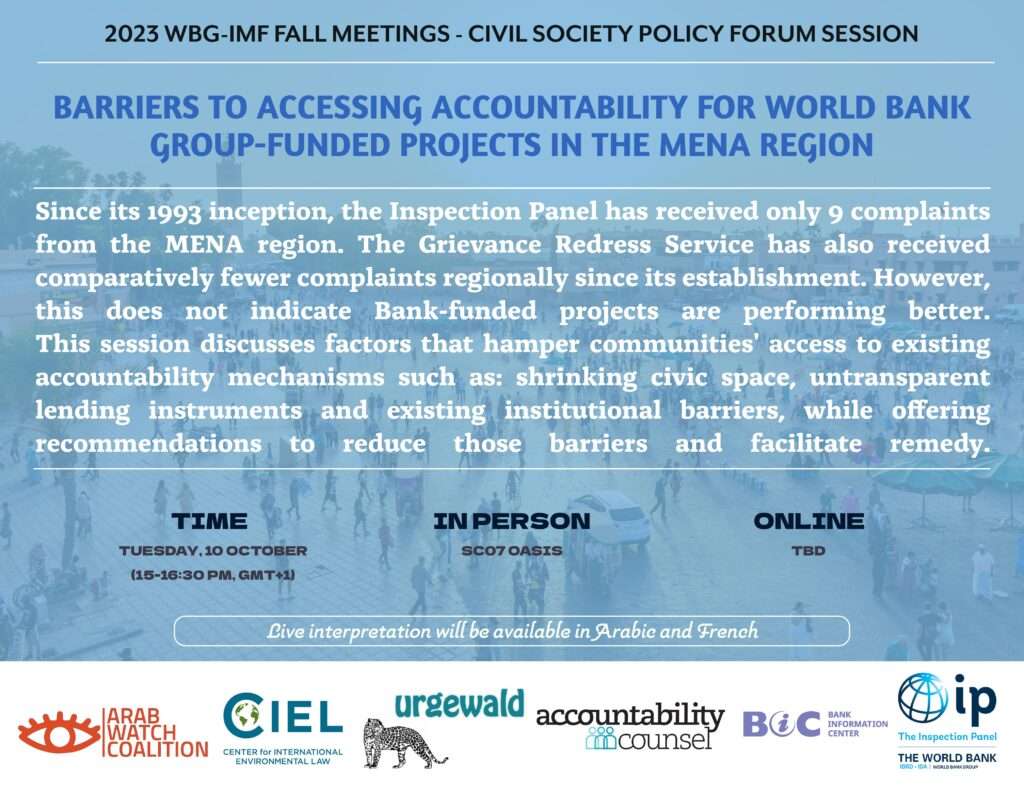Published October 5th, 2023
*Note: The World Bank Group and the International Monetary Fund, together with the Moroccan Government, made the decision that this year’s Annual Meetings in Marrakech will continue as planned after the recent earthquake in Morocco. CIEL will continue to monitor the evolving context and support local and regional partners who have been affected by the disaster.*
Next week, the World Bank Group (WBG) and International Monetary Fund (IMF) will host their Annual Meetings in Marrakech, Morocco, from October 9 to October 15.
This yearly event is a combination of official closed-door meetings among World Bank and IMF leadership, public seminars on global economic development, and high-level events featuring prominent officials. The Civil Society Policy Forum (CSPF) held during the meetings is one of the most critical opportunities to influence the institutions, as it allows civil society organizations (CSOs) and communities affected by development projects to engage directly with bank staff and officials.
The typical agenda at the Annual Meetings and CSPF includes discussions of major financial events and trends impacting the institution, as well as its borrower countries, private sector clients, and partner investors. This year, there are several significant circumstances that will influence the conversation, including the appointment of Ajay Banga as new World Bank President, the ongoing conversations about the Bank’s Evolution Roadmap, and the growing public calls for the Bank to uphold its development mandate to “do no harm” by committing to effective, participatory, and fully financed remedy and responsible exit frameworks.
Here’s what we’ll be advocating for throughout the week:
Ensuring the World Bank’s Vision for the Future Doesn’t Repeat Past Mistakes
Earlier this year, the World Bank Group released its Evolution Roadmap, which was meant to set a bold, updated mission and vision to address the most pressing development challenges to people and the planet, including the climate crisis, debt, and pandemics. However despite its lofty goals, the plan charts business as usual, with a blanket funding increase as the top priority. Disappointingly, there was no mention of human rights anywhere in the initial draft, nor discussion of how the Bank would ensure greater accountability as part of the institutional goal of a “bigger and better bank” for the future.
Since the Evolution Roadmap’s initial release and public consultation period, CIEL and partners have been leading efforts calling on the WBG to adopt a vision that puts people at the heart of its mandate. This can only be accomplished if the Bank commits to providing remedy when Bank-financed projects have contributed to harm, and remaining involved and accountable in projects — even when they become problematic — until proper consultations can be held to resolve affected communities’ concerns. With the right priorities, this evolution process can be pivotal opportunity for the World Bank to finally live up to its mandate to “do no harm” by learning from its past mistakes.
During the CSPF, CIEL and partners are convening a panel of Bank leadership to discuss past cases and key accountability lessons to guide the Bank in creating a more just, inclusive, and successful evolution for the future. Moderated by Accountability Counsel’s Policy Associate Gregory Berry, the event will feature:
- Dominique Favre, Executive Director for Switzerland at the World Bank
- Abdoul Salam Bello, Executive Director for Africa Group II at the World Bank and Co-Chair of the Committee on Development Effectiveness (CODE)
- Janine Ferretti, Director General, Compliance Advisor Ombudsman (CAO), World Bank Group
- Ramanie Kunanayagam, Chair of the Inspection Panel at the World Bank
Join us for this conversation on Tuesday, October 10th, 3:00-4:30 p.m. GMT +1 at SC06 Acacia (livestream will be made available here).
Live interpretation in French and Arabic will be provided.
Improving Access to Accountability for Communities in the MENA Region
In 1993, CIEL and partners helped establish the first accountability mechanism at the World Bank, the Inspection Panel, which paved the way for the creation of other independent accountability mechanisms (IAMs) at other development finance institutions (DFIs). While the establishment of IAMs was an important accomplishment, it was not a panacea for communities who have been harmed by World Bank-financed projects. Many barriers to accountability still remain, including a lack of information about Bank involvement in projects, lack of awareness about the existence of the Bank’s accountability mechanisms, opaque lending instruments, risk of reprisals, time-consuming complaint processes, and the Bank’s failure to guarantee remedy for harm.
In particular, the historical number of complaints the World Bank’s Inspection Panel has received from the Middle East and North Africa (MENA) region has been abnormally low compared to the rest of the world. Similarly, the Grievance Redress Service has received fewer requests from the MENA region since its creation.
During the CSPF, we are co-organizing an event with partners to discuss the different factors hampering communities’ access to accountability mechanisms and offer recommendations for how both the mechanisms and institutions can reduce those barriers and facilitate remedy. Moderated by Accountability Counsel’s Senior Communities Associate, Robi Chacha Mosenda, the event will feature:
- Lama Almoayed, Research Associate, Accountability Counsel
- Dustin Schaefer, Head of IFI-Team, Urgewald
- Suzan Nada, Board Member, Arab Watch Coalition
- Ramanie Kunanayagam, Chair of the Inspection Panel, World Bank
- Additional panelists to be confirmed
Join us for this conversation on Thursday, October 12th from 9:00-10:30 a.m. GMT+1 at SC07 Oasis (livestream will be made available here).
Live interpretation in French and Arabic will be provided.
To keep up with these important conversations during the CSPF, follow CIEL on Twitter.


